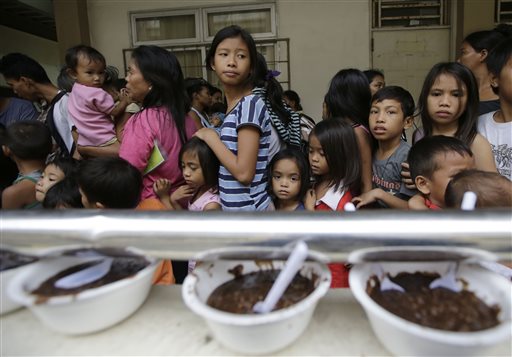Evacuees reminded of ways to prevent spread of disease

Children-evacuees queue up for free chocolate rice porridge as they seek shelter at an evacuation center upon orders from the local government in anticipation of Typhoon Hagupit which is expected to make its fourth landfall in Batangas province south of Manila Monday, Dec. 8, 2014 in the Philippines. AP
MANILA, Philippines—If you want to donate goods to victims of Tropical Storm Ruby (international name Hagupit), exclude infant formula from the list.
The Department of Health reiterated Monday its “no milk donation” policy during disasters to protect infants from serious illnesses that may arise from improper use and handling of powdered milk.
In a bulletin, the health agency said the incidence of gastroenteritis, or infectious diarrhea, surged in the past whenever donated canned milk and milk formula were accepted for use in the evacuation centers where the safety of water supply is not always assured.
The DOH also urged mothers in evacuation centers to continue to breastfeed exclusively their infants up to six months of age.
“The DOH is working with the Department of Social Welfare and Development and local health authorities to ensure that evacuation centers are mother and baby-friendly,” it said.
Article continues after this advertisementInfant formula is not allowed for donation to typhoon victims since drinking water needed to prepare milk is unreliable in times of emergencies and calamities.
Article continues after this advertisementDonating such is also in violation of the rules of the Milk Code, a law that promotes breastfeeding.
To prevent the spread of diseases in evacuation centers, the health agency also ordered local health authorities to conduct free vaccination of children aged between six months and five years old against measles and polio and supplementation of vitamin A.
It also directed that sick children be taken immediately to the nearest government health facility to avert possible outbreak of communicable diseases that are common in compressed living conditions, such as cough and colds, eye infections and measles.
People seeking shelter in cramped evacuation centers were also reminded to observe proper hygiene and sanitation by washing their hands properly before and after eating and using the toilet.
“Boil water for drinking and cooking. Water must continuously boil for at least two minutes from the time water starts boiling,” the DOH said.
It also reminded typhoon victims to clean wounds promptly with water and soap and get a tetanus shot at the nearest health center. They must also wear boots if wading through floodwaters is inevitable to prevent contracting leptospirosis.
Leptospirosis is an infection commonly transmitted to humans from water that has been contaminated by animal urine, particularly rats, and comes in contact with lesions in the skin or eyes.
“These reminders are being issued to ensure that people in Typhoon Ruby affected areas remain disease-free and to prevent the spread of disease and its complications,” said the DOH.